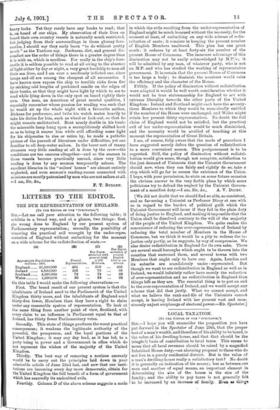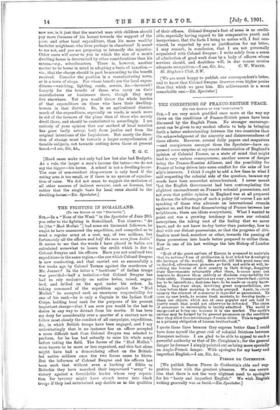LOCAL TAXATION.
[TO THE EDITOR OF T1111" SPECTATOR., SIE,—I hope you will reconsider the proposition you have put forward in the Spectator of June 29th, that the proper test of a man's wealth, and therefore of his ability to be taxed, is the value of his dwelling-house, and that that should be the (single ?) basis of contribution to local taxes. This seems to mean that all local revenues should be raised by a magnified Inhabited House duty,—an alarming proposal to those who do not live in a purely residential district. But is the value of a man's dwelling-house really a satisfactory test? No doubt it is generally an indication of his means ; but as between one man and another of equal means, an important element in determining the size of the house is the size of the family; and the ability to pay taxes is not generally felt to be increased by an increase of family. Even as things
now are. is it just that the married man with children should pay more (because of his house) towards the support of the poor, and other local expenditure, than his more wealthy bachelor neighbour, who lives perhaps in chambers? It seems to me not, and you are proposing to intensify the injustice• Other cases will occur to you in which the size of a man's dwelling-house is determined by other considerations than his means,—e.g., schoolmasters. There is, however, another matter to be borne in mind in adopting a basis of taxation,— viz., that the charge should in part be according to the benefit received. Consider the position in a manufacturing town, or in a town of shops. For whose benefit are the local expen- ditures—watching, lighting, roads, sewers, &c.—incurred P Largely for the benefit of those who carry on their manufactures or businesses there, though they may live elsewhere. Yet you would throw the whole burden of that expenditure on those who have their dwelling- houses in that district. So, in an agricultural district, much of the expenditure, especially on roads, is much more in aid of the farmers of the place than of those who merely dwell there, and should be contributed to accordingly. I am entirely of your opinion that our method of local taxation has gone badly astray, both from justice and from the original intentions of the Legislature. But surely the direc- tion of change must be towards a larger comprehension of taxable subjects, not towards cutting down those at present
[Hard cases make not only bad law but also bad Budgets. As a rule, the larger a man's income the better—we do not say the bigger—his house. A school is not a dwelling-house. The case of non-resident shop-owners is only hard if the rating area is too small, or if there is no system of equalisa- tion of rates. We did not mean to suggest the exclusion of all other sources of indirect revenue, such as licenses, but rather that the single basis for local rates should be the dwelling-house.—ED. Spectator.]



















































 Previous page
Previous page